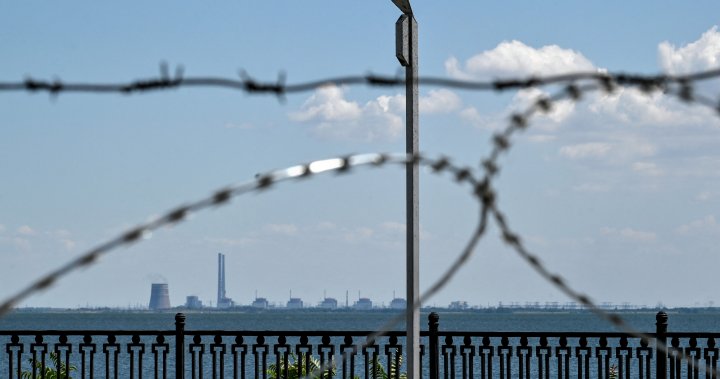Ukrainian nuclear plant again faces shelling as Kyiv warns of Russian ‘scorched earth’ – National | Globalnews.ca
Russia and Ukraine are trading accusations that each side is shelling Europe’s biggest nuclear power plant, in southern Ukraine.
Russia on Monday claimed that Ukrainian shelling caused a power surge and fire and forced staff to lower output from two reactors, while Ukraine has blamed Russian troops for storing weapons there.
Nuclear experts have warned that more shelling of the Zaporizhzhia nuclear power station, which was captured by Russia early in the war, is fraught with danger. The Kremlin echoed that statement Monday, claiming that Ukrainian shelling could create “catastrophic” consequences for Europe.
Ukraine’s military intelligence spokesman, Andriy Yusov, countered that Russian forces have planted explosives at the plant to head off an expected Ukrainian counteroffensive in the region.
Previously, Ukrainian officials have said Russia is launching attacks from the plant and using Ukrainian workers as human shields.

Rafael Grossi, director general of the International Atomic Energy Agency, has warned that the way the plant was being run under Russian forces and the fighting going on around it pose grave health and environmental risks.
An expert in nuclear materials at Imperial College London, however, said the reactor at Zaporizhzhia is modern and housed inside a heavily reinforced steel and concrete building designed to protect against disasters.
“As such I do not believe there would be a high probably of a breach of the containment building even if it was accidently struck by an explosive shell, and even less likely the reactor itself could be damaged by such,” said Mark Wenman at the college’s Nuclear Energy Futures.
He also said the spent fuel tanks, where the shells reportedly hit, are strong and probably don’t contain much spent fuel.
“Although it may seem worrying, and any fighting on a nuclear site would be illegal according to international law, the likelihood of a serious nuclear release is still small,” he said.
Read more:
Russia’s capture of Europe’s largest nuclear plant in Ukraine raises global alarm
Before Sunday’s shelling, the nuclear plant also came under fire last week.
Russian Defense Ministry spokesman Lt. Gen. Igor Konashenkov said Monday that the Ukrainian attack Sunday caused a power surge, and smoke at its switch facility, triggering an emergency shutdown.
Fire teams extinguished the flames, and the plant’s personnel lowered the output of reactors No. 5 and No. 6 to 500 megawatts, he said.
Kremlin spokesman Dmitry Peskov urged Western powers to force Kyiv to stop attacking the plant.
“Shelling of the territory of the nuclear plant by the Ukrainian armed forces is highly dangerous,” Peskov said in a conference call with reporters.
“It’s fraught with catastrophic consequences for vast territories, for the entire Europe.”
But Yusov, Ukraine’s military intelligence spokesman, said the shelling came from Russian forces.
“If it’s not so,” he added, “if it doesn’t conform to reality, the Russians can make a goodwill gesture and hand over control of the plant to an international commission and the IAEA, if not to the Ukrainian military.”
Read more:
Russian attack on major Ukrainian nuclear power plant ‘unacceptable’, says Trudeau
Yusov said Russia used similar tactics at Ukraine’s Chernobyl nuclear plant when they occupied it early in the war.
“This is a strategy of terror and scorched earth used by the Russians ahead of an inevitable Ukrainian counteroffensives in the south,” he said.
Meanwhile, one of the ships that left Ukraine under a deal to unblock grain supplies and stave off a global food crisis arrived in Turkey, becoming the first vessel to reach its destination.
Read more:
Three more grain ships leave Ukrainian ports under UN deal
The Turkey-flagged Polarnet, laden with 12,000 tons of corn, docked at the port of Derince after setting off from Chornomorsk on Friday.
“This sends a message of hope to every family in the Middle East, Africa, and Asia: Ukraine won’t abandon you,” Ukrainian Foreign Minister Dmytro Kuleba tweeted. “If Russia sticks to its obligations, the `grain corridor’ will keep maintaining global food security.”
Polarnet Captain Ahmet Yucel Alibeyler highlighted the risks faced by grain-carrying ships trying to cross the Black Sea.
“These were, of course, dangerous areas, corridors that had been cleared, demined,” he said.
On the front lines of the war, the Kremlin reasserted Monday that Russia will keep up its military attacks on Ukraine until it achieves its goals.
Ukraine’s presidential office said the Russians had shelled seven Ukrainian regions over the previous 24 hours, killing five people.
Ukrainian forces struck Russian-controlled areas in the south, local officials said, again hitting a strategic bridge in the southern city of Kherson.
Read more:
U.S. Embassy in Ukraine calls Russia’s attack on nuclear plant a ‘war crime’
The Ukrainian mayor of Melitopol, a Russian-controlled city in the neighboring Zaporizhzhia region, said Ukraine used U.S. HIMARS rocket launchers to shell several facilities where the Russian military was stationed.
Kirill Stremousov, deputy head of the Moscow-appointed administration of the Kherson region, said Ukrainian shelling again damaged the Antonivskiy bridge over the Dnieper River. An artery for Russian military supplies, the bridge has been closed in recent weeks because of earlier shelling, and plans to reopen it on Wednesday were now shelved, Stremousov said.
Russian forces also kept shelling Nikopol, just across the Dnieper River from the Zaporizhzhia nuclear plant, Ukraine’s presidential office said.
Nikopol’s gas pipelines, plumbing and power lines are no longer functioning, leaving thousands of people without electricity.

A total of 12 ships have now been authorized to sail under the grain deal between Ukraine and Russia, which was brokered by Turkey and the United Nations — 10 outbound and two inbound.
Some 322,000 metric tons of agricultural products have left Ukrainian ports, the bulk of it corn but also sunflower oil and soya.
Four ships that left Ukraine on Sunday are expected to anchor near Istanbul on Monday evening for inspection Tuesday to make sure they are carrying only food items and no weapons.
The first cargo ship to leave Ukraine, the Sierra Leone-flagged Razoni, which left Odessa on Aug. 1, hit a snag, however. It was heading for Lebanon with 26,000 metric tons of corn for chicken feed, but ran into a business dispute and will no longer dock there, the Tripoli port chief said.
Ukraine’s embassy in Beirut tweeted Monday that the corn’s final buyer in Lebanon refused to accept the cargo due to a delivery delay, and that the shipper was looking for another customer.
© 2022 The Canadian Press
For all the latest world News Click Here




